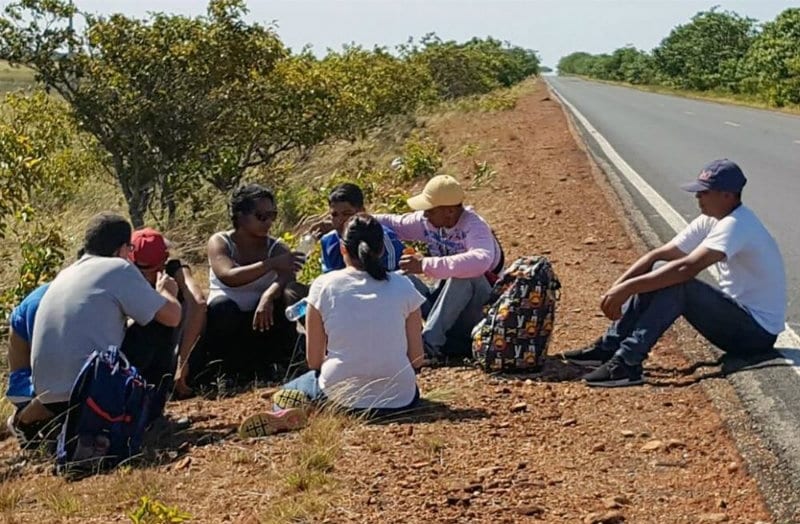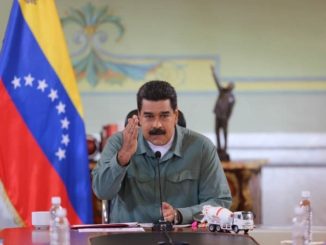
CARACAS – Venezuela’s humanitarian crisis is spilling across its borders, Human Rights Watch said in a statement on Tuesday.
Latin American governments need to apply strong pressure on the Maduro administration to address severe shortages of medicine and food in Venezuela that are causing Venezuelans to leave the country, it urged.
“Brazil is struggling to meet the urgent needs of Venezuelans who are victims of a humanitarian crisis for which the Maduro administration is largely to blame,” said José Miguel Vivanco, Americas director at Human Rights Watch. “Brazil and other regional governments will ultimately have to press the Venezuelan government to stop denying the crisis and to take adequate steps to fix the problem.”
Tens of thousands of Venezuelans have fled a humanitarian crisis that their government denies exists and is not addressing adequately. Thousands have gone to Brazil, many entering via the border that Venezuela shares with the Brazilian state of Roraima.

Some seek protection there as refugees, others seek temporary work, while others make visits seeking desperately needed medical care. The unprecedented influx of Venezuelans is straining Roraima’s already overburdened public health care system and clogging Brazil’s system for processing asylum applications.
On Tuesday, the Human Rights Watch presented its findings on the impact of Venezuelan immigration to Brazil to Almagro. “Putting Venezuela at the top of the region’s foreign policy priorities is key to addressing a problem that is already having an impact outside of Venezuela’s borders,” Vivanco said.
Venezuelan Migration to Brazil
More than 12,000 Venezuelans have entered and stayed in Brazil since 2014, according to official sources. The number of Venezuelans moving to Brazil has increased more than five-fold from 2014, reaching 7,150 during the first 11 months of 2016.

Many Venezuelans are living in precarious conditions on the streets and in a shelter in Boa Vista, Roraima’s capital. Despite the difficult conditions, all of the more than 60 Venezuelans Human Rights Watch interviewed in February said they were better off in Brazil than in Venezuela.
The demand for health care by Venezuelans is making it increasingly difficult for the state’s public health system to meet the needs of all its patients, both Brazilian and Venezuelan.

The General Hospital of Roraima, which serves 80 percent of adults in the state, provided care to 1,815 Venezuelans in 2016, up more than three-fold from 2015. In February 2017, the hospital’s director told Human Rights Watch that the facility was treating an average of 300 Venezuelan patients a month.
The number of Venezuelan women seeking care at Roraima’s maternity hospital almost doubled in 2016, to 807.

At the hospital in the border town of Pacaraima, about 80 percent of patients are Venezuelans, and Venezuelan women made more than half of prenatal care visits between January and August 2016.
Even in the hospitals where Venezuelans make up a small proportion of total patients, several health care professionals and officials said the increase in the patient load is aggravating existing strains on the state’s public health care system.
Brazilian health care providers said that Venezuelans tend to arrive at the hospital sicker than Brazilians, having failed to receive adequate treatment at home. Many are treated for complications because conditions such as HIV/AIDS, pneumonia, tuberculosis, and malaria have been left untreated due to shortages of medicines in Venezuela.
As a result, doctors said, Venezuelan patients more frequently require hospitalization than local patients. Health care professionals said that even before the influx of Venezuelan patients, hospital capacity was insufficient to meet demand.
Threat of Deportation
According to information gathered by the office of the UN High Commissioner for Refugees (UNHCR) in Brazil over the past five months in Roraima, the influx from Venezuela is mixed – some would qualify for international protection as refugees while others would not. Former officials of the Brazilian refugee agency told Human Rights Watch that they shared the same view.

The Brazilian government reported that the number of Venezuelans seeking asylum has skyrocketed, from 54 in 2013 to 2,595 in the first 11 months of 2016. As of December 31, the Justice Ministry had only decided 89 of the 4,670 cases of Venezuelans who had requested asylum since 2012, granting asylum in 34 of those cases. The backlog of unresolved claims from Venezuelans is slowing the processing of all asylum claims throughout Brazil.
More than 4,000 Venezuelans in Roraima have been stuck for months on a waiting list for appointments to file asylum requests. Brazilian law allows people who have requested asylum to stay in Brazil, obtain work permits, and enroll their children in school. But it is unclear whether the appointment slips that the Federal Police have been handing out, some for as late as 2018, are valid to certify that the person has an official temporary permission to stay.
Even if Venezuelans are not deported while they wait for their appointment, they have no legal authorization to work, which makes them vulnerable to exploitation.

In 2016, authorities deported 514 Venezuelans from Roraima – compared with just 20 in 2015. The Federal Police tried to deport 450 members of the Venezuelan Warao indigenous people in December, but the federal Public Defender’s Office filed a habeas corpus petition with a local judge on the grounds that the attempt was arbitrary, and the judge stopped the deportation at the last minute.
In March, the Brazilian National Council of Migration, which is part of the Ministry of Labor, approved a resolution to grant Venezuelans two-year residence permits, a move that could ease pressure on the overwhelmed Brazilian asylum process if adequately implemented.
Humanitarian Crisis
Venezuela is experiencing a profound humanitarian crisis, as Human Rights Watch and others have documented. Medicine, basic medical supplies, and even food are in such short supply that many Venezuelans cannot feed their families or get adequate medical care. Low and middle-income families who rely on items subject to government-set maximum prices are particularly affected.

The Venezuelan government’s response has been woefully inadequate. Denying that a crisis exists, authorities have neither implemented effective policies to alleviate it nor made serious efforts to obtain international humanitarian aid that could significantly bolster its own limited efforts.
In late March, President Nicolás Maduro said on television that he had asked the United Nations for help to obtain medicines, without providing any additional information, but he still has not acknowledged the extent of the crisis.
Meanwhile, Venezuelans’ rights to health and food are being seriously undermined, with no end in sight.



